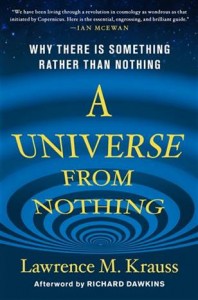 Nothing induces humility quite like grappling with theoretical physics. Richard Dawkins and some of his contemporaries in the fields of biology and evolutionary psychology posit that our brains evolved to contemplate numbers on a much smaller scale than is required for complex mathematics, population studies or something as seemingly uncomplicated as dating the age of our planet. Though we can manipulate a number like one billion, though we know how many millions it constitutes, and how many thousands, the ability to conceptualize it eludes most of us. Consider the discrepancy between science’s best estimate of the age of our planet (4.54 billion years) and the ravings of creationists and biblical literalists that our earth is only ten thousand years old. Dawkins has called this a “non-trivial” error, bemoaning the ubiquity with which the latter figure is thrown out in religious discussions and politics, and comparing the magnitude of error to thinking that Los Angeles and New York City are separated by millimeters rather than thousands of kilometers. But what to do with 4.54 billion? One billion years contains ten million centuries, one hundred million decades. Our planet’s 4.54 billion years contains the entire history of our species, and untold numbers of prior species. It is cliche, but often only cliche will do: our entire existence, from caves to skyscrapers, constitutes a cosmic blink of the eye.
Nothing induces humility quite like grappling with theoretical physics. Richard Dawkins and some of his contemporaries in the fields of biology and evolutionary psychology posit that our brains evolved to contemplate numbers on a much smaller scale than is required for complex mathematics, population studies or something as seemingly uncomplicated as dating the age of our planet. Though we can manipulate a number like one billion, though we know how many millions it constitutes, and how many thousands, the ability to conceptualize it eludes most of us. Consider the discrepancy between science’s best estimate of the age of our planet (4.54 billion years) and the ravings of creationists and biblical literalists that our earth is only ten thousand years old. Dawkins has called this a “non-trivial” error, bemoaning the ubiquity with which the latter figure is thrown out in religious discussions and politics, and comparing the magnitude of error to thinking that Los Angeles and New York City are separated by millimeters rather than thousands of kilometers. But what to do with 4.54 billion? One billion years contains ten million centuries, one hundred million decades. Our planet’s 4.54 billion years contains the entire history of our species, and untold numbers of prior species. It is cliche, but often only cliche will do: our entire existence, from caves to skyscrapers, constitutes a cosmic blink of the eye.
If this discomforts you, Krauss offers little consolation. The age of our known universe is 14.72 billion years, and investigations into how it all began – the brunt of this challenging book – inevitably end up raising more questions than they answer. The book is part theory, part survey of 20th century physics, a kind of forensic detective story with a very ambitious goal, bluntly revealed by the title: how is it that a universe, so large in scope and immensity, can form from nothing? In attempting to answer that question, Krauss weaves a tale of greater awe and grandeur than any yet served up by the human imagination.
But if the picture Krauss paints is increasingly bleak – a cold, indifferent and ever-expanding universe destined, one day, to implode, will cheer few – the message of his book is one of increasing optimism. He grounds his philosophical discussions in the personal: Krauss’ initial attraction to theoretical physics was the hope of answering the big questions, particularly “why” and “how” we are here. Inspired by what he thought as a profound search for meaning, he has come to believe that the future of physics might very well be that of “just another environmental science,” which is not to disparage the latter but to speak to the impossibility of attaining to the questions of ultimate meaning. In quoting Camus, he implicitly likens himself – and, in the process, all of mankind – to Sisyphus, doomed to the menial task of pushing a boulder up a hill only to have it roll down and have to repeat the process. The myth is often used as an allegory for man’s plight, the absurdity of our irrelevance in a godless universe; but for Krauss, as for Camus, Sisyphus is smiling, taking pleasure in his labor rather than any particular endgoal. It is an incredibly difficult thing to do, to smile in the face of aridity and disenchantment, but the mere possibility – to me, at least – is infinitely uplifting.